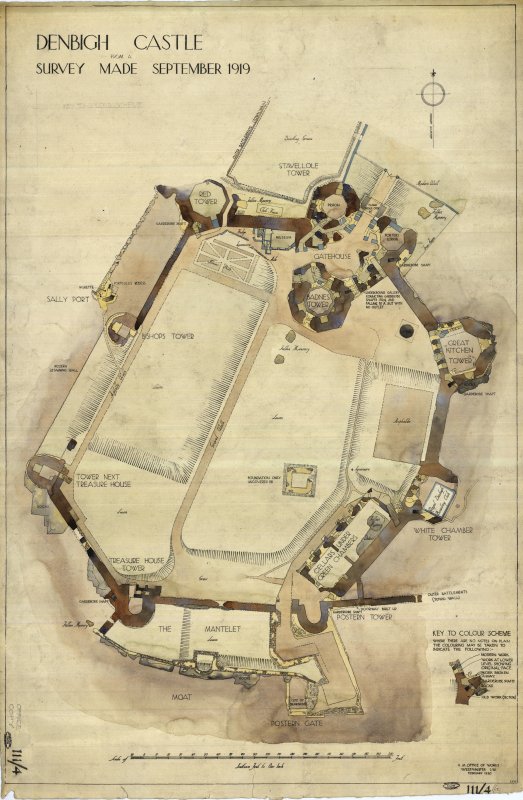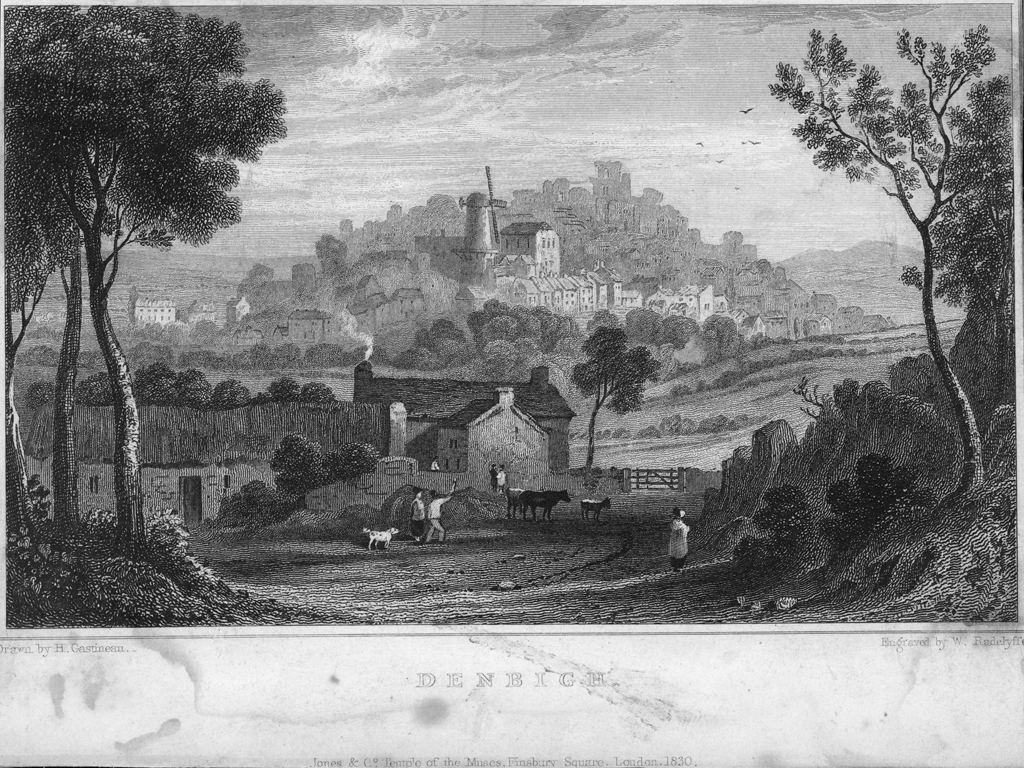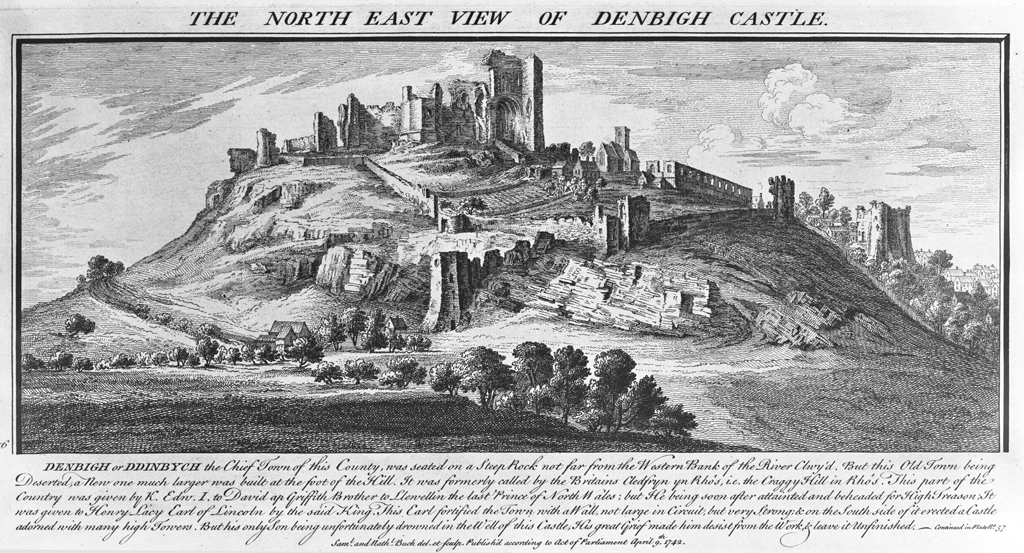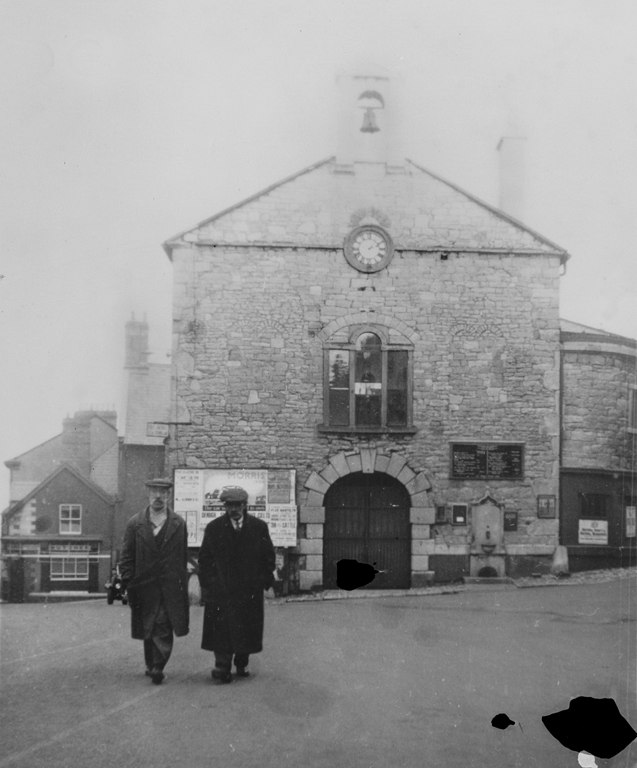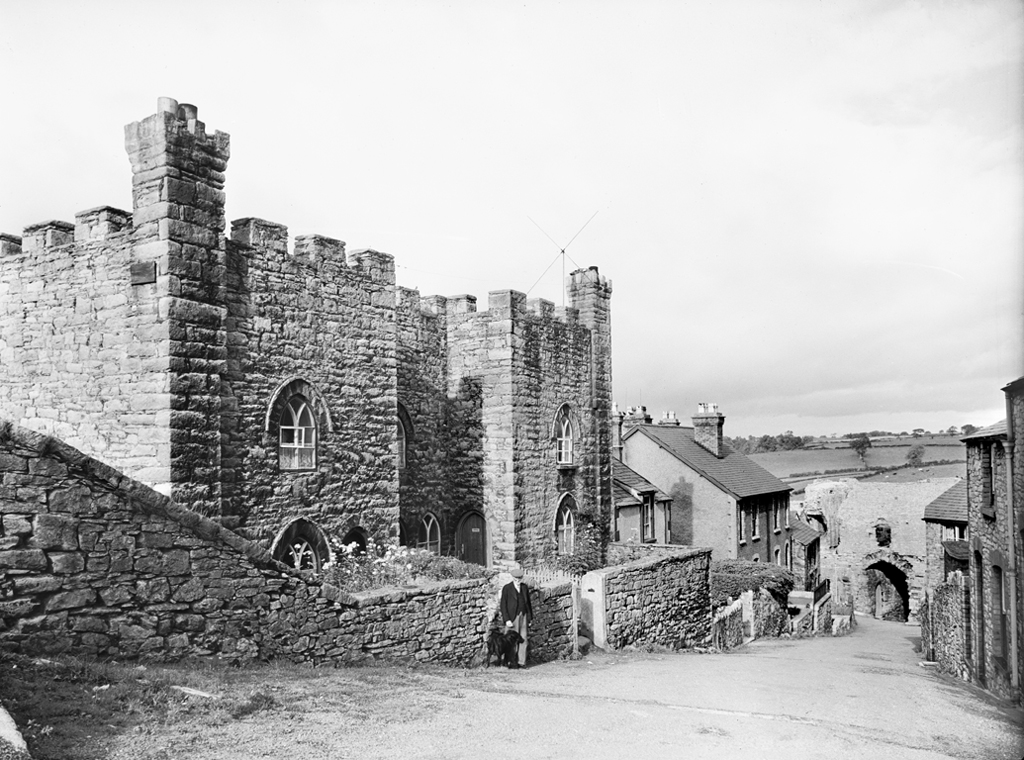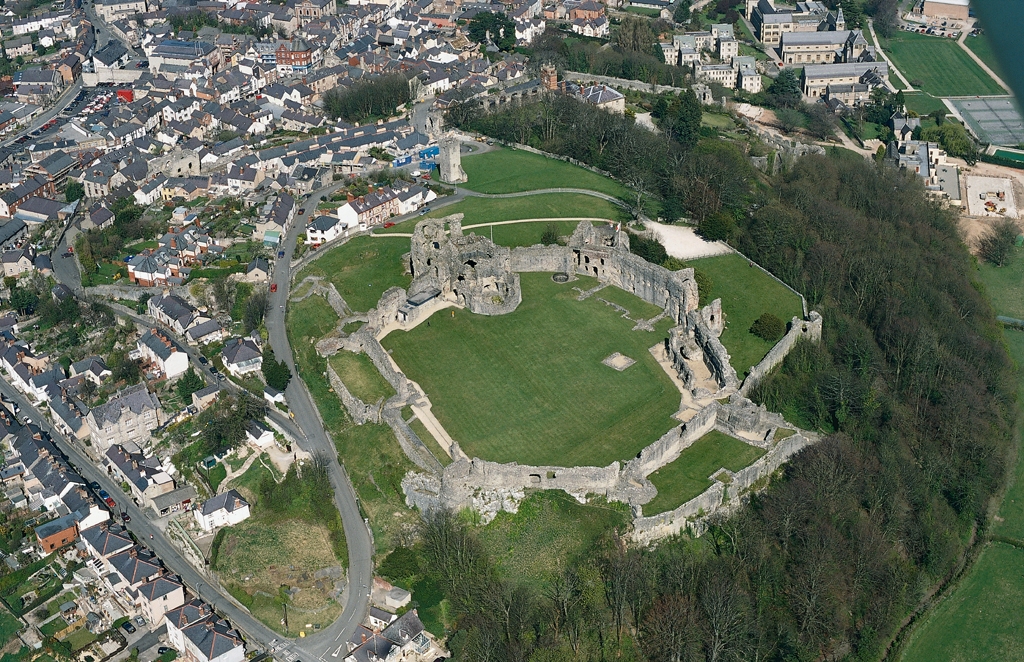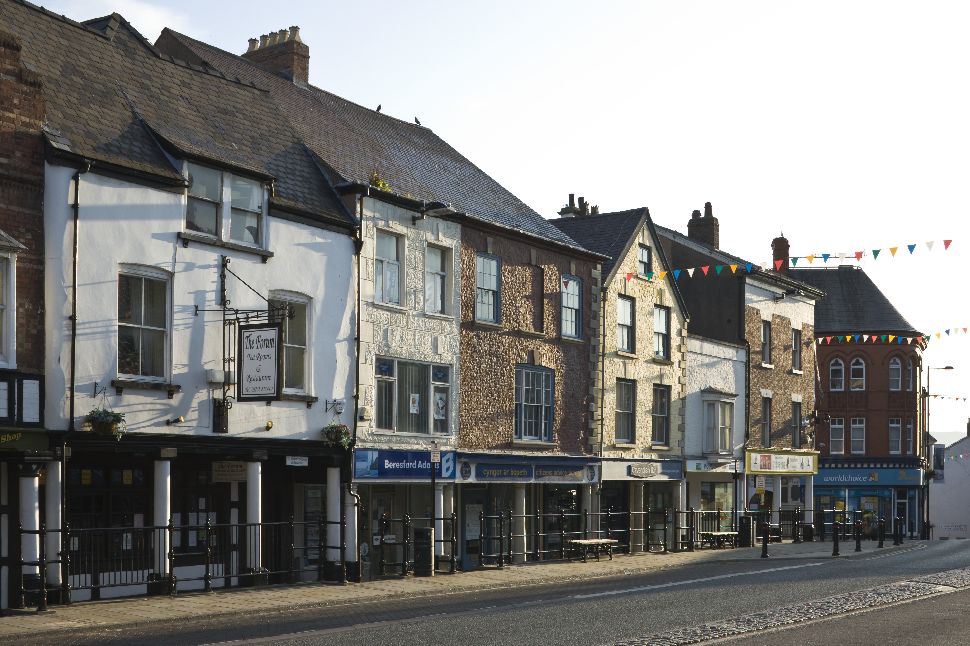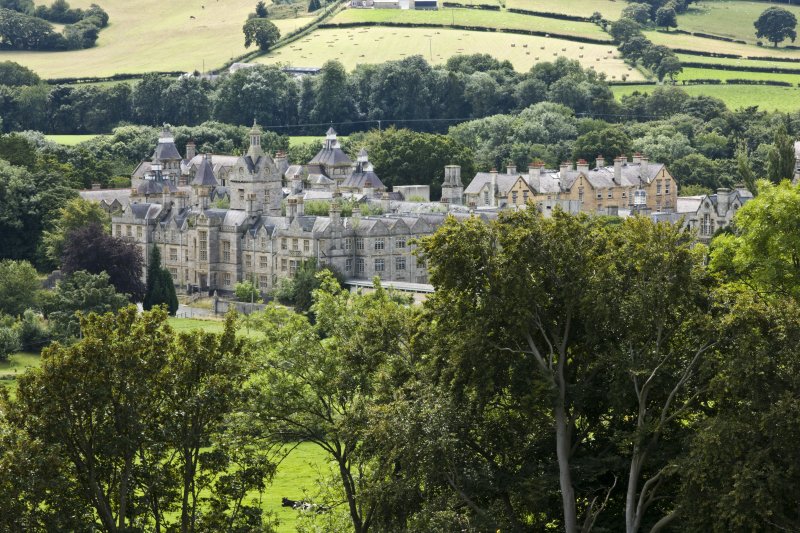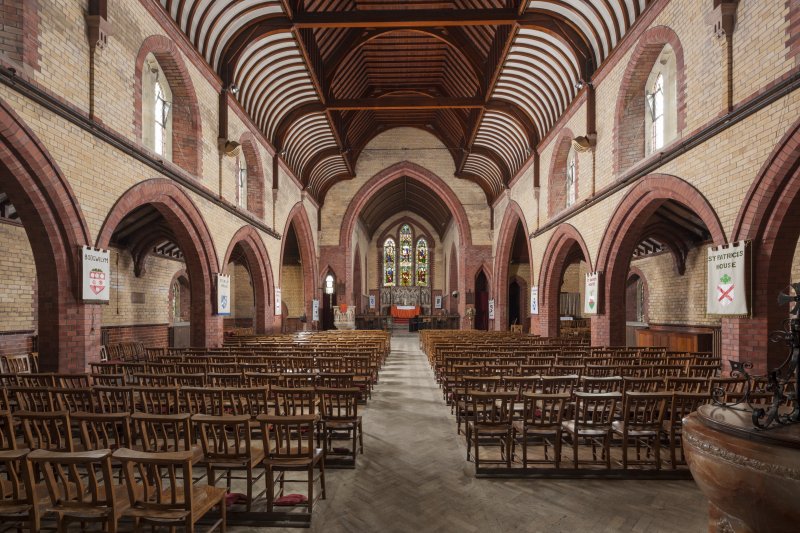Denbigh - Overview
Denbigh is a small market town in Denbighshire. Its origins lie in the twelfth century, appearing in a poem of 1160, though the earliest charter dates to 1211. Documentary evidence indicates a castle of the Welsh princes existed in the vicinity of the current town, though its location is unknown. The current castle was established by Henry de Lacy, Lord of Denbigh, in 1282 after being granted the land by Edward I.
It received its first Town Charter in 1285, and this, together with subsequent charters, indicates that the town was divided into an ‘English’ walled borough on top of the hill, and a ‘Welsh’ town ‘without the walls’. Throughout the fourteenth century, the town outside the walls expanded, overtaking the borough which eventually declined in importance. During this time, the first, and only, Carmelite Friary in Wales was established along with the great double-nave church of St Marcella.
In 1400, Owain Glyndŵr’s forces attacked, damaging the town, but ultimately failing to take the castle. The town status was increased when, after the 1536 Act of Union with England, it was made one of four administrative capitals in Wales. This was cemented in 1563 when Elizabeth I made Robert Dudley, Earl of Leicester and her closest confidant, Baron of Denbigh. He set about transforming the town with an ambitious building public building programme including the Shire hall and St David’s Church – the first major Protestant church to be built after the Reformation in Great Britain.
Denbigh was again the scene of activity during the Wars of the Roses and the English Civil War where it was held for the Royalists. Following their surrender to Oliver Cromwell in 1646, the castle was abandoned and subsequently fell into decay. The eighteenth and early nineteenth centuries were a period of great economic prosperity for the town, and the Georgian and Victorian architecture of the town reflects this.
Situated along the main road linking Llangollen and St Asaph, the ruins of Denbigh Castle attacked many visitors especially during the nineteenth century. Whereas Prince Hermann von Pückler-Muskau appeared impressed by the tri-annual national meeting of competing Welsh harpists inside the castle ruins, Franz von Löher was glad to give the spectacle a miss as he found the Welsh supremely lacking any musical talent. He did, however, spare a moment of praise for the supreme quality of the dinner on offer at his inn in Denbigh town.
Accounts of Travel
"Wanderung durch Nordwales", 1846
Franz von Löher (1818 – 1892)
Die Nacht blieb ich in Denbigh und bekam zum Nacht essen außer Thee und Schinken, gedörrtem Fleisch und dreierlei Butterbrod noch den allervortrefflichsten Berghammel, nicht minder preiswürdigen frischen Lachs, Krebse, die einem Prälaten ins Herz gelacht hätten, und kleines Muschelzeug, welches ich nicht kannte.
Den 18ten [Juli 1846]. In Denbigh war ebenfalls Markt und die Straße mit Menschen besäet. Ich stieg zu den überaus schönen Burgtrümmern hinauf. Diese bedecken die ganze Stirn eines Felsberges, der sich mitten in dem weiten Thale und vortrefflich zu dessen Ueberwachung geeignet erhebt. Höfe, Hallen und Gemächer kann man sich noch deutlich vorstellen, namentlich nimmt sich die Capelle in ihren Trümmerbogen gut aus. Die Aussicht ist nach allen Seiten anziehend, wenn auch nicht abwechselnd. Hier oben wird alle drei Jahre das Preisspielen der wälschen Barden oder Harfner gehalten, ich möchte es nicht anhören, denn der Geist der Musik scheint die Wälschen nicht zu seinen lieben Kindern zu zählen.
That night I stayed in Denbigh and my evening meal consisted, besides tea and ham, of dried meat and three types of buttered bread in addition to the most excellent mountain mutton, no less priceworthy fresh salmon, crayfish that would have made a prelate’s heart leap, and some dish with mussels unknown to me.
18 [July 1846]. Denbigh too held a market and the streets were alive with people. I climbed up to the exceedingly beautiful castle ruins. They covered the entire front of the rocky mountain, which rises in the middle of the wide valley and so makes it suitable for the surveillance of its surroundings. It is still possible to picture distinctly the courtyards, halls and chambers; the chapel with its ruined arches looks particularly splendid. The prospect on all sides is arresting, albeit not diverse. Up here, the Welsh bards and harpists hold their games every three years. I would not like to listen to them, because it appears the spirit of music does not count the Welsh among its own dear children.
Briefe eines Verstorbenen, 1828
Hermann von Pückler-Muskau (1785 – 1871)
An den Seiten des Berges klammern sich ringsum die baufälligen Häuser und Hütten des ärmlichen Städtchens an, und mit Mühe gelangt man durch die engen Gassen zum Gipfel. Ein Herr zeigte mir gütig den Weg, welcher sich mir nachher als den Herrn Stadt-Chirurgus dekouvrirte, und mit vieler Artigkeit die Honneurs der Ruine machte. In ihren Mauern haben sich die Honoratioren ganz romantisch ihr Casino, nebst einem sehr zierlichen Blumengärtchen angelegt, von welchem letztern man eine vortreffliche Aussicht genießt. Der übrige Theil des weitläufigen Schlosses bietet dagegen nur ein verlassenes Labyrinth von Mauern und Grasplätzen dar, wo die Distel wuchert. Alle drei Jahre wird jedoch auf diesem Platz ein großes Nationalfest gehalten – die Versammlung der welschen Barden. Gleich den ehemaligen Minnesängern Deutschlands kommen hier sämmtliche Harfner aus Wales zum Wettkampf zusammen. Der Sieger gewinnt einen goldnen Becher, und ein gemeinschaftlicher Chor von hundert Harfen hallt zu seinem Ruhm in den Ruinen wieder. In drei Monaten sollte die Vereinigung statt finden, zu der man auch den Herzog von Sussex erwartete.
The side of the hill is covered with the ruinous houses and huts of the miserable little town, and you climb through its narrow lanes to the top. A gentleman, who afterwards declared himself to be the surgeon of the town, very kindly showed me the way, and did the honours of the ruins with great politeness. Here is a sort of casino most romantically situated within the walls, and a very pretty flower-garden, commanding a beautiful view. The rest of this vast edifice offers only a neglected labyrinth of walls, standing amid the rank luxuriance of grass and thistles. Every third year, notwithstanding, a great national festival is held on this spot; – the meeting of Welsh bards, who, like the old German Minnesingers, repair hither to a trial of skill. The victor wins a golden cup; and a chorus of a hundred harps resounds to his fame amid these ruins. The meeting will take place in three months, when the Duke of Sussex is expected to be present.
(Tour in England, Ireland, and France, in the Years 1828 & 1829. With Remarks on the Manners and Customs of the Inhabitants, and Anecdotes of Distinguished Public Characters. In a Series of Letters. By a German Prince. Ed. B –. Vol. 1. London: Effingham Wilson, 1832)
